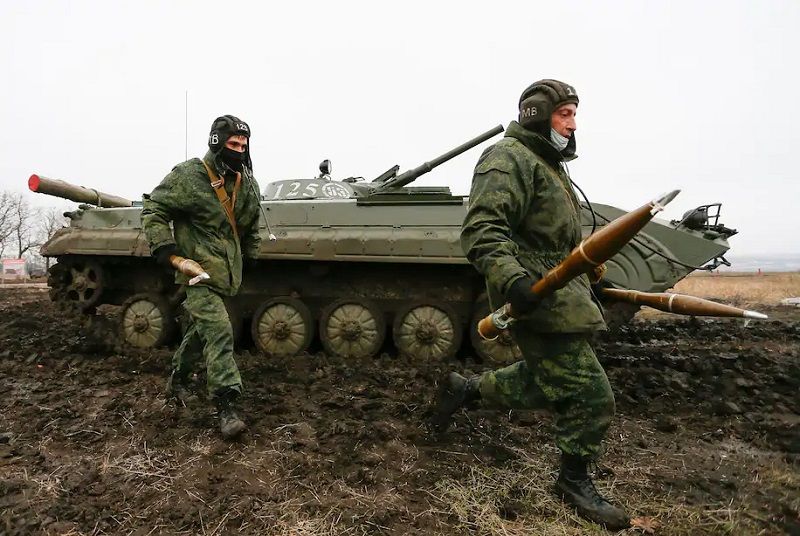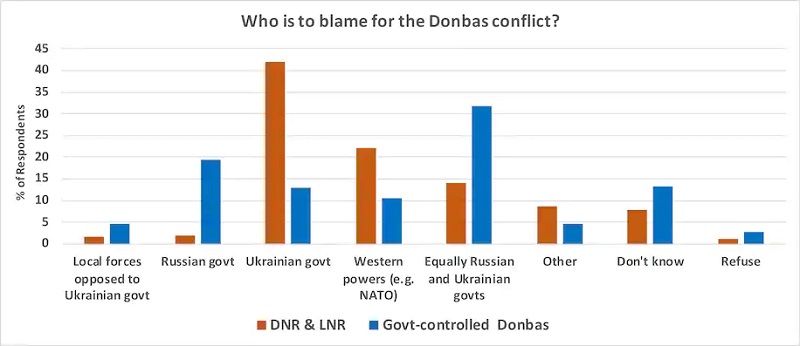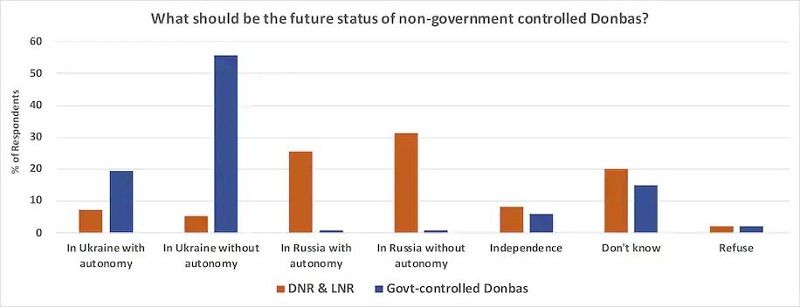
Few are likely to celebrate the anniversary of the agreement that stabilized a war in the Donbas, a region in eastern Ukraine. Negotiated by the leaders of Russia, Ukraine, Germany and France, the Minsk II accords of Feb. 12, 2015, left the Donbas territorially divided. The Ukrainian government in Kyiv control western parts of the Donbas, while two separatist entities, the “Donetsk and Luhansk Peoples Republics” (DNR/LNR), control eastern parts, including major cities like Donetsk and Luhansk as well as the border with Russia.
After nearly seven years of division, how do ordinary people in both parts of the Donbas feel about the situation? In a simultaneous survey in the government-controlled and breakaway areas, our research reveals two populations with very different attitudes about the war that divided them and their future territorial status.
Donbas is at the intersection of many conflicts
Today’s territorial divide in the Donbas is the result of the intersection of conflicts at three different scales. The first is a geopolitical conflict between the West and Russia over the westernizing aspirations of Ukraine. Russia perceived the Maidan protests of February 2014 that ousted Ukraine’s pro-Russian president as a plot against its sphere of influence.
The second conflict is between Ukraine and Russia over the territorial integrity of Ukraine. Russian forces annexed Crimea in early 2014 in response to the perceived plot. They also intervened to directly prop up the DNR/LNR in August 2014 when its forces were in retreat.
The third is a conflict within Ukraine between different visions of the nation and its identity. The DNR/LNR rebels have used the Donbas’s long-standing distinctive regional identity to fuel rebellion against Kyiv and align with Moscow.
War brought destruction and division within the Donbas, and around 14,000 people have died. Over 2 million have fled the region — either to other parts of Ukraine (1.6 million) or to Russia (over 600,000). Violence, de facto partition, economic depression and trade boycotts have severely damaged the fabric of the region. Environmental and humanitarian crises fester. Political repression, criminal violence, controlled media, information blockages and coronavirus have only made things worse.
How we did the research
To gauge opinions in both regions, we conducted simultaneous computer-assisted telephone interviews in September and October 2020. We contracted with two highly reputable survey companies — the Levada Center Moscow for the DNR/LNR and the Kyiv Institute of Sociology in the government-controlled Donbas — to implement the same questionnaire with approximately 1,000 respondents on each side of the cease fire line.
Here we report the results of two key questions: attitudes about blame for the Donbas conflict and preferences for the future political status of the DNR/LNR. The differences across the line of contact are dramatic and, compared to earlier surveys, seem to be widening.
Who blames whom?
Central to any conflict — and certainly to conflict resolution — is the attribution of blame, and people’s views on possible outcomes. As shown on the figure below, two-thirds of the respondents in the DNR/LNR blame either the Ukrainian government or the West for the war. By contrast, most in the Kyiv-controlled territories attribute blame equally to their own government and to Russia.

In these government-controlled areas about the same percentage attribute blame to the Ukrainian government or the West (23 percent) as to the Russian government, an allocation matched by the 32 percent who blame the Russian and Ukrainian governments equally. This blame distribution is similar to those of earlier comparative surveys.
What do people think about the future status of the breakaway areas?
In Kyiv-controlled Donbas, a strong majority thinks that the separatist regions should be returned to Ukraine without any special consideration of autonomy. Just a small number consider alternative options of independence for the separatist entities or joining Russia.
In contrast, in the breakaway territory controlled by the DPR/LNR and funded by Russia, over half of the respondents want to join Russia, either with or without some autonomous status. Less than one-tenth want independence and only 12 percent want to be reintegrated into Ukraine.

Of course, this type of question is a sensitive one in a contested territory — and one reason for the high ratio of “don’t know” responses. Younger adults and people who self-identify as Russians are more likely to choose the option of joining Russia.
The results of this survey are sobering reading for all those interested in reconciliation and peace building in the Donbas. Survey evidence from 2019 showed majority support in the DNR/LNR for remaining part of Ukraine.
What these latest results suggests is that time may be on the side of those who want this conflict. The longer the war simmers, the more partition endures, the wider the divide becomes. This suits the interests of political elites both in the DNR/LNR and in Russia. Desire to return to Ukrainian government control in the breakaway territories appears to be fading, though further research is needed to confirm this. The longer the Minsk II negotiating process remains stalled, the more intractable this conflict becomes.
John O’Loughlin, college professor of distinction at the University of Colorado at Boulder, is a political geographer with research interests in the human outcomes of climate change in sub-Saharan Africa and in the geopolitical orientations of people in post-Soviet states.
Gwendolyn Sasse, director of the Centre for East European and International Studies (ZOiS) in Berlin and Senior Research Fellow at Nuffield College, University of Oxford, researches the dynamics of war, identities, protest and migration. She is currently engaged in a series of survey projects in Ukraine, Russia and Belarus.
Gerard Toal, professor in the School of Public and International Affairs at Virginia Tech’s campus in Arlington, is the author of Near Abroad: Putin, the West and the Contest for Ukraine and the Caucasus (Oxford University Press, 2019) and co-author of Bosnia Remade: Ethnic Cleansing and Its Reversal (Oxford University Press, 2011). He is currently writing a book on geopolitics and climate change. Kristin M. Bakke is a professor of political science and international relations at University College London and associate research professor at the Peace Research Institute Oslo. Her current research focuses on postwar state-building and wartime legacies, as well as geopolitical orientations in post-Soviet states.
The authors acknowledge funding for this work from a joint National Science Foundation/Research Council UK grant (NSF award #1759645; ESRC award #ES/S005919/1) and from ZOiS (Centre for East European and International Studies), Berlin.
